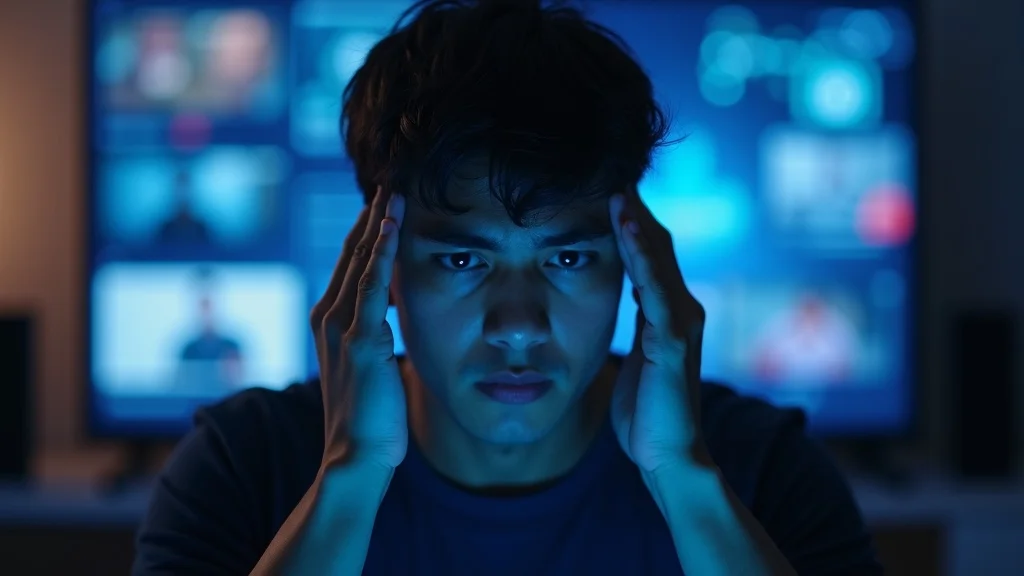Did you know? The average person now absorbs more information in a single day than someone from the 15th century did in their entire life. If your mind feels scattered by endless digital distractions or you’re constantly fighting to keep your attention on track, you’re not alone. Information overload has silently reshaped how we live, work, and even how we think—but it doesn’t have to control you. This article will reveal the hidden costs, proven coping strategies, and personal lessons that can help you beat information overload and reclaim your precious focus.

A Shocking Truth: How Information Overload Impacts Our Daily Lives
From the moment we wake, our senses are bombarded—emails waiting, social media notifications pinging, breaking news alerts flashing. The amount of information we process on a daily basis is unprecedented in history. Navigating this tidal wave isn’t just about managing a busy schedule; it’s about regaining the ability to focus on what truly matters. For the average worker in a modern work environment, the sheer volume of digital input can fragment attention, reduce deep work time, and impact well-being on both an individual and a societal level. If left unchecked, information overload can lead to chronic stress, poor productivity, and even mental health challenges such as anxiety and decision fatigue.
The phenomenon doesn’t discriminate—students, professionals, parents, and even retirees all face the challenges of sifting through large amounts of information just to keep up. This creates a vicious cycle, where the more information we try to process, the less we retain, and the more distracted we become. The negative effect ripples from personal life into work, relationships, and even our ability to make meaningful decisions.
“The average person consumes more information in a day than someone in the 15th century would encounter in their entire lifetime.”
What You'll Learn About Information Overload in This Article
Wondering how to navigate this complex topic? Here’s what you’ll take away by the end of this read:
- Definition and causes of information overload
- Key consequences of information overload on mental health and productivity
- Personal insights and coping strategies
- The role of technology and social media
- Expert tips to reclaim focus

Understanding Information Overload: The Modern-Day Epidemic
Information overload has become a defining feature of the digital age, affecting people at every level—from the individual to the societal. As production of information accelerates through information technology and social networks, our daily lives absorb a volume of data unimaginable to previous generations. Unlike past centuries, where information was precious and scarce, we now face the opposite problem: too much of everything, all the time. This has resulted in unique challenges for mental and physical well-being, with growing attention from psychology, computer science, and information systems fields.
Researchers and leaders agree that we must actively manage our digital intake, as passive consumption is likely to undermine both individual and team member performance over time. Recognizing the systematic review findings, it’s clear that a strategic approach is needed to avoid the negative effects of continuous connectivity, large amounts of digital alerts, and information design pitfalls in our work environment. The modern epidemic of information overload is not just a buzzword—it’s a critical issue that determines who thrives in the 21st century and who becomes overwhelmed by the noise.
Defining Information Overload in the Digital Age
At its core, information overload describes the state where the quantity of information exceeds the ability of an individual or team to process, filter, and make sense of it. This isn’t just about having “a lot of data”—it’s about the human brain’s limited capacity for handling large amounts of information. In the digital age, the constant stream of emails, notifications, messages, and news fragments our attention on a daily basis. Individuals may find themselves compulsively checking updates, only to realize that very little of this input was genuinely relevant information or required immediate action.
As information systems become more sophisticated, we risk feeling perpetually “behind”—convinced that new data points are always waiting just out of reach. While some information is critical for performance, the information load imposed by an unfiltered feed quickly becomes unsustainable. The need to manage information intake grows more essential each year, as our lives become increasingly digitized and the sources of information multiply at exponential speed. Understanding this definition clarifies why coping strategies are essential for anyone wishing to thrive in today’s interconnected world.

The Role of Information Technology and Social Media
Information technology and social media are both blessings and curses in the battle against information overload. On one hand, they have democratized access to information, allowing team members and individuals to tap into a global pool of knowledge. On the other hand, these platforms are designed for maximum engagement, often at the expense of user wellbeing. With every ping, post, and pop-up, we’re drawn deeper into an attention economy that rewards immediate reaction over meaningful thought. Social network algorithms curate content designed to keep us scrolling, making it harder to manage information intentionally.
This reality has far-reaching consequences for information processing at the individual level. With the amount of information one encounters just by opening a phone, deciding what’s essential becomes an increasing challenge. Information technology constantly accelerates production of new sources of information, but without well-developed filtering skills, users are exposed to an overwhelming information load. The negative effects of this cascade from individual well-being to productivity in the work environment, and even the way organizations manage team member performance. This dual-edge nature of technology underscores why strategic coping strategies matter more now than ever.
Dealing with Information Overload on a Personal Level
Navigating information overload on a personal level starts with honest awareness. Many of us don’t even realize when our brains are reaching the tipping point until we experience fatigue, distraction, or anxiety. Large amounts of information, especially when unfiltered or lacking relevance, contribute to cognitive exhaustion and a sense of drowning in digital noise. This challenge escalates for those required to handle vast sources of information as part of their profession, increasing both psychological and performance pressure. Even well-designed information systems can burden users who haven’t developed personal boundaries or filtering routines.
Effective coping begins with small shifts: setting boundaries for social media use, building daily routines that prioritize relevant information, and practicing deep work in distraction-free settings. It’s also crucial to understand that information overload affects everyone differently, and what works for one person or team member may not suit another. Finding the right balance between digital connectivity and mindful disconnection is the cornerstone of managing information on an individual level. When integrated consistently, these habits restore clarity, confidence, and the energy to make truly meaningful decisions.
| Era | Sources of Information | Volume of Information | Filtering Methods |
|---|---|---|---|
| 15th Century | Parchments, spoken word, face-to-face | Very limited | Community, elders |
| Today | Social media, internet, apps, news, email | Overwhelmingly large amounts | Algorithms, self-curation, notifications |

The Consequences of Information Overload: Personal and Societal Effects
The impact of information overload reaches well beyond mere distraction. On a personal level, the negative effects include heightened anxiety, irritability, and a diminished ability to focus on complex tasks. As more of the day is devoted to exchanging, sorting, and disregarding irrelevant information, creativity and strategic thinking decline. This has profound effects not only at the individual level but also within teams and organizations, where productivity and well-being are directly correlated with information clarity. Research from literature reviews and systematic reviews in psychology and computer science reveals that unresolved overload can lead to chronic stress and burnout—issues that are alarmingly widespread in today’s knowledge economy.
Societally, an abundance of misinformation and shallow news cycles makes it increasingly difficult to distinguish fact from noise. This reduces trust, polarizes social networks, and inhibits informed decision-making on critical issues. The overwhelming production and consumption of information affects how communities respond to events, engage with each other, and adapt to constant change. On both a micro and macro level, adapting to this new normal requires more than technical solutions—it demands mindful, consistent personal intervention to filter, question, and prioritize what truly matters.
Consequences of Information and the Psychological Toll
The psychological toll of dealing with information overload is often underestimated. Mentally, the brain faces a constant stream of shifting contexts, which disrupts deep focus and leads to difficulties in memory and comprehension. Physiologically, excessive screen time and rapid context-switching can cause fatigue, stress headaches, and disrupted sleep patterns. People may find themselves increasingly distracted during conversations, unable to fully engage with colleagues, family, or friends—a direct consequence of our brains struggling to process large amounts of new, often irrelevant, input. The negative effect spirals when people try to compensate by multitasking, which only magnifies the problem, leading to even lower overall productivity and well-being.
On the societal level, the consequences of information overload are seen in rising rates of digital burnout, declining trust in sources of information, and a culture that prizes immediacy over depth. As teams and organizations wrestle to manage this flood, the need for robust coping strategies becomes clear—not only to protect individual mental health but also to preserve long-term performance and innovation in the workforce. The challenge is not the amount of information alone but our collective failure to filter and apply it meaningfully.

How Information Overload Affects Focus, Wellbeing, and Productivity
When every moment is saturated with incoming data, it becomes nearly impossible to identify what is truly important. This overload erodes our capacity for concentration, causes wellbeing to suffer, and often leads to decreased output across professional and personal realms. Employees who struggle to manage information end up missing deadlines, making careless errors, or feeling disengaged from their work environment. As the quality of work diminishes, so does the individual’s sense of satisfaction and accomplishment. From a systematic review standpoint, the connection between the sheer volume of information and negative effects on productivity and performance is well established within literature review and computer science studies.
Beyond the workplace, the constant bombardment from social media, notifications, and news can drain emotional energy, disrupt sleep, and even increase the risk of anxiety or depression. It’s no coincidence that many people report feeling persistently tired, scattered, and unable to “switch off”—the result of an unrelenting information load. To counteract these negative effects, it is increasingly vital to adopt informed coping strategies and create intentional boundaries with digital devices.
“When everything is essential, nothing truly is.”
Coping Strategies: Reclaiming Control Over Dealing with Information Overload
Despite the challenges of information overload, those who develop coping strategies can not only survive but thrive in the digital age. The ability to filter, prioritize, and disconnect is a powerful skill, allowing individuals to regain control over their time, performance, and mental health. By adopting deliberate routines and boundaries, anyone can limit the negative effect of constant digital noise and foster deeper focus and creativity. This section highlights practical, actionable steps you can start using today to reverse information overload and build better habits around technology.
Whether you’re an executive, a student, or a parent, the keys to overcoming information overload are surprisingly universal: reduce unnecessary data streams, prioritize high-value information, and cultivate moments of digital silence throughout the day. Together, these strategies can transform the way you relate to technology, making it a tool for empowerment rather than a source of stress.

Actionable Coping Strategies for Managing Information Overload
- Limiting digital distractions and social media use: Unfollow, mute, or unsubscribe from unnecessary sources of information. Schedule social media checks, rather than reacting in real-time to every alert, to help your mind focus on what matters most.
- Setting boundaries with information technology: Create device-free zones and designate “no notification” hours to foster intentional engagement with your environment and the people around you. By managing information access, you regain a sense of calm and control.
- Prioritization and deep work: Break your to-do list into priorities and designate specific, uninterrupted periods for focused work. Deep work is the antidote to distraction and a proven way to boost real productivity and creative output.
- Establishing information hygiene routines: Schedule regular “decluttering” of your digital ecosystem. Delete unneeded files, turn off non-essential alerts, and bookmark high-value resources for later review. These routines keep your digital workspace manageable and your brain refreshed.
Research from systematic reviews and training intervention studies show that these simple coping strategies can produce significant improvements in concentration, stress levels, and overall daily basis satisfaction. Start with one change and gradually build up as your capacity for handling information grows stronger.

Personal Reflections: My Journey with Dealing with Information Overload
My own journey with dealing with information overload began in a typical way—through years of embracing every new technology, social network, and productivity app under the sun. At first, the promise of staying connected seemed irresistible. But over time, the sheer quantity of information became overwhelming. My mind would race from one half-remembered headline to the next, never quite fully landing on a single, meaningful task. Productivity and wellbeing suffered, and it became clear that simply “keeping up” was not sustainable on an individual level.
The turning point came when I acknowledged that the negative effects on my focus, creativity, and wellbeing were directly related to information overload. Through trial and error, I discovered that intentionally limiting both the sources of information and my exposure times created space for clarity, calm, and true engagement—at work and at home. I learned to celebrate progress, not just productivity, and to savor the power of being present. While the temptation to reintroduce digital chaos is always nearby, a deliberate personal routine has become the guiding principle that sustains my focus and energy for what matters most.

“Battling information overload requires intentional action every day.”
People Also Ask: Information Overload FAQs

How to fix information overload?
To fix information overload, practice digital decluttering, set priorities, take breaks from screens, and embrace mindful information consumption habits to reduce cognitive fatigue.
What are the 5 causes of information overload?
Five main causes include too much information, rapid information technology advances, constant alerts from social media, lack of filtering skills, and insufficient information management routines.
Do people with ADHD get information overload?
Yes, individuals with ADHD are more susceptible to information overload due to challenges with focus, filtering, and managing overwhelming input.
What are the symptoms of information overload?
Symptoms can include anxiety, irritability, difficulty focusing, decreased productivity, and decision fatigue.
Video Resources: How to Beat Information Overload
Curated Videos on Coping Strategies for Dealing with Information Overload
Explore curated video resources that showcase real-life coping strategies—ranging from daily digital detox routines to simple methods for improving information hygiene. These videos help you visualize techniques for setting boundaries, prioritizing critical tasks, and reconnecting with what matters most away from the noise of your devices.

Expert Opinions on Information Overload and Modern Life
“Information overload is not the consequence of too much information, but of failing to ask the right questions.” – Expert Source
Experts in psychology, computer science, and information design echo the sentiment that information overload is less about the absolute volume of data and more about intentional, meaningful curation. Organizations that succeed in today’s world actively train team members in filtering skills, encourage mindful technology use, and focus on developing resilience—not just efficiency. The challenge lies in learning to apply critical thinking, question sources of information, and resist the lure of multitasking. As a result, those who master these habits become leaders not just at the individual level, but within their communities and industries.
Key Takeaways: Beat Information Overload and Regain Your Clarity
- Information overload affects everyone in the digital age
- Identifying and managing triggers is key to prevention
- Personal and societal consequences are significant but manageable
- Simple coping strategies can drive lasting change
Conclusion: Start Reclaiming Your Focus Today
Take intentional steps to manage your digital world, prioritize what matters, and reclaim lasting focus—your mind and wellbeing will thank you.
For a personal conversation on overcoming information overload, call me the Chaplain 786-333-5270
Information overload, also known as infobesity or information anxiety, refers to the difficulty in understanding and making decisions when one is presented with too much information. This phenomenon has been recognized since the 1960s and has intensified with the advent of modern information technology and social media. (en.wikipedia.org)
A 2016 Pew Research Center survey found that while most Americans appreciate having abundant information at their fingertips, about 20% feel overloaded. The study also noted that individuals with fewer technological resources are more likely to experience information overload. (pewresearch.org)
The Mayo Clinic Health System highlights that cognitive overload occurs when the brain is overwhelmed by excessive information, leading to a state of paralysis where one cannot process or act on the information received. This is often exacerbated by the constant influx of data from various digital sources. (mayoclinichealthsystem.org)
To manage information overload, experts recommend strategies such as setting boundaries with technology, prioritizing tasks, and practicing mindfulness to improve focus and reduce stress.
 Add Row
Add Row  Add
Add 




Write A Comment